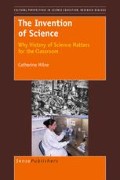Abstract
In this chapter we will begin to examine the path that some forms of systematic knowledge took on the way to becoming what we recognize as Eurocentric science. In doing so, we have to acknowledge the influence of some thinkers, and the institutes and movements they inspired, on the practices and policies of hundreds of years of European thought. Communities develop narratives that seek to explain their relationship with the earth and other aspects of the world they observe. Some of the people that we will examine were able to galvanize groups of people in academies and schools to become disciples for their ways of thinking and being. Much of what we know about these movements is tied up with how their ideas continued to be communicated through texts and testimonies, helping us also to acknowledge the importance of a written language for representing ideas. Other aspects worthy of our consideration for understanding the development of Eurocentric science are how these ideas can be preserved through time either through translation or through preservation. For example, as the archeological excavation of Herculaneum proceeds, people hope that more carbonized scrolls will be found that will contain the writings of Greek and Roman philosophers. Destroyed by the eruption of Vesuvius in 79 CE, Herculaneum provides a time capsule of ancient Rome.
Access this chapter
Tax calculation will be finalised at checkout
Purchases are for personal use only
Preview
Unable to display preview. Download preview PDF.
Author information
Authors and Affiliations
Rights and permissions
Copyright information
© 2011 Sense Publishers
About this chapter
Cite this chapter
Milne, C. (2011). Making Arguments. In: The Invention of Science. Cultural Perspectives in Science Education: Research Dialogs, vol 4. SensePublishers. https://doi.org/10.1007/978-94-6091-525-3_2
Download citation
DOI: https://doi.org/10.1007/978-94-6091-525-3_2
Publisher Name: SensePublishers
Online ISBN: 978-94-6091-525-3
eBook Packages: Humanities, Social Sciences and LawEducation (R0)


